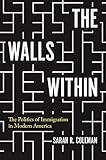The walls within : the politics of immigration in modern America / Sarah R. Coleman.
Call number: 325.73 C692W 2021 Material type: Computer fileSeries: Politics and society in modern AmericaPublisher: Princeton, New Jersey : Princeton University Press, 2021Description: 1 online resourceISBN: 9780691185927Subject(s): Immigrants -- Legal status, laws, etc. -- United States | Illegal aliens -- United States | United States -- Emigration and immigration -- History -- 20th century | United States -- Emigration and immigration -- History -- 21st century | United States -- Emigration and immigration -- Government policyDDC classification: 325.73 C692W 2021 Online resources: ดูปกและสารบัญ (see cover and contents)
Computer fileSeries: Politics and society in modern AmericaPublisher: Princeton, New Jersey : Princeton University Press, 2021Description: 1 online resourceISBN: 9780691185927Subject(s): Immigrants -- Legal status, laws, etc. -- United States | Illegal aliens -- United States | United States -- Emigration and immigration -- History -- 20th century | United States -- Emigration and immigration -- History -- 21st century | United States -- Emigration and immigration -- Government policyDDC classification: 325.73 C692W 2021 Online resources: ดูปกและสารบัญ (see cover and contents) หนังสืออิเล็กทรอนิกส์ (e-book)
Includes bibliographical references and index.
Introduction : the tough question -- The rose's sharp thorn : Texas and the rise of unauthorized immigrant education activism -- "A subclass of illiterates" : the presidential politics of unauthorized immigrant education -- "Heading into uncharted waters" : Congress, employer sanctions, and labor rights -- "A riverboat gamble" : the passage of employer sanctions -- "To reward the wrong way is not the American way" : welfare and the battle over immigrants' benefits -- From the border to the heartland : local immigration enforcement and immigrants' rights -- Epilogue.
"In 1965, the Hart-Celler Act abolished the national origins quotas of the 1920s that had severly limited immigration to American from everywhere but Western Europe. The result was mass immigration from Latin America, Asia, the Caribbean, and Southeast Asia. The wave of immigration and the restrictionism it produced led to a bitter political struggle over immigrants' rights that continues to this day. This book is a history of the post-1965 political battles between advocates of expansive admissions policies, rights, and benefits for immigrants and their anti-immigration, or restrictionist, opponents. Coleman argues that as immigration rendered what had once been seen as hard boundaries of the physical nation-state into something more porous, the rights of immigrations became crucial to immigration control. Restrictionists sought to limit immigrants' access to the American welfare state by arguing that they were a burden to the state and taking jobs from working- and middle-class Americans. However, the legacies of the civil rights movement, a growing commitment to deregulation, unusual political alliances, and institutional structures provided significant barriers to anti-immigration efforts. By the end of Reagan's presidency, restrictionists efforts to reverse the flow of immigration rights failed at the national level. In the 1990s, however, with national policy-making gridlocked, restrictionists focused their efforts on the state level. States acquired new powers in driving immigration policy and curtailed the expanded notion of alienage rights that had been forged over the previous decades. Coleman provides a new way of understanding the political history of immigration, looking not at borders and admissions policy but at the broad, internal battles over domestic policy that resulted from immigration. The author draws on a wealth of new sources from the Carter, Reagan, and Clinton administrations as well as from immigration and civil rights organizations. This book reveals that the current wave of anti-immigration sentiment seen in the electoral success of Donald Trump is not a recent phenomenon but has deep roots in the post-1965 immigration battles"--


There are no comments on this title.